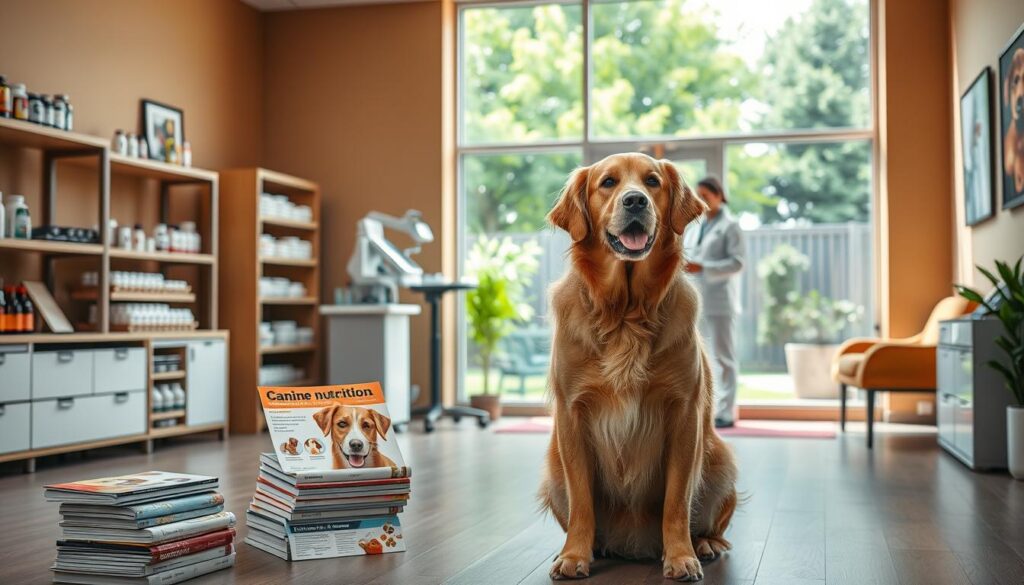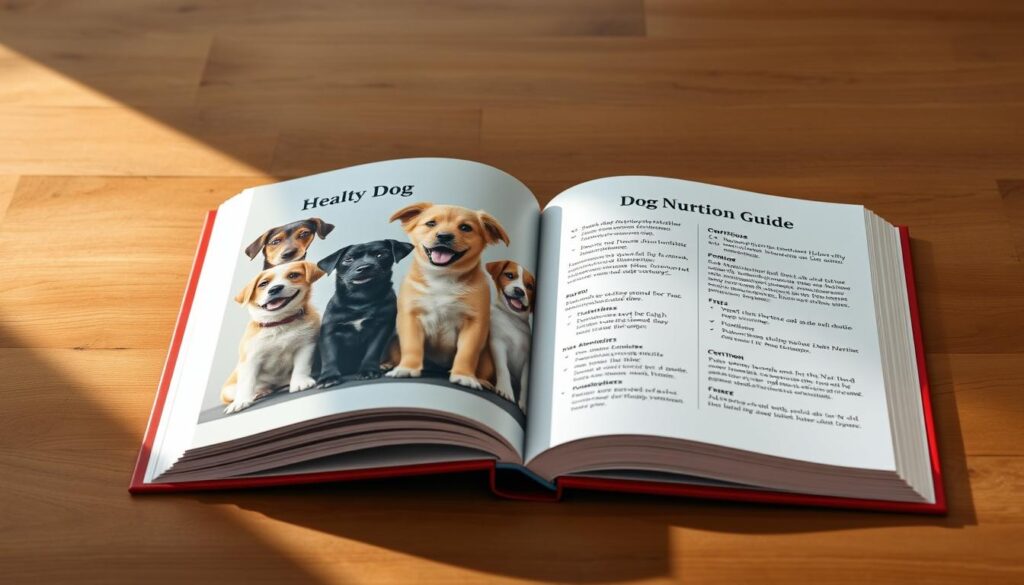
Welcome to the ultimate guide on keeping your dog healthy and long-lived! Dogs are more than pets; they’re family members who bring joy and companionship. Our guide will show you how to keep your furry friend vibrant and healthy for years. Keep Your Dog Healthy.
Dog nutrition and exercise are key to your pet’s health. We’ll share vet-approved tips for your dog’s long, healthy life.
Every dog deserves a happy, healthy life. You can help your dog thrive and enjoy many years with the proper care and commitment.
Key Takeaways
- Proper nutrition is fundamental to dog health and longevity
- Regular exercise keeps dogs physically and mentally fit
- Preventive veterinary care is essential for early disease detection
- Mental stimulation contributes to overall dog wellness
- Consistent health monitoring can extend your dog’s life
Understanding the Basics of Canine Health and Longevity: Keep Your Dog Healthy

Every dog owner dreams of their pet living a long, healthy life. Knowing what affects your dog’s health and longevity is key. Dogs are unique, with changing health needs as they grow older.
Dog life expectancy varies a lot. Breed, size, genetics, and care all matter. Smaller dogs often live longer, up to 15-16 years.
Factors Affecting Dog Life Expectancy
Several things impact your dog’s longevity:
- Breed-specific health characteristics
- Genetic predispositions
- Quality of nutrition
- Regular exercise
- Comprehensive veterinary care
Common Health Challenges in Different Dog Breeds: Keep Your Dog Healthy
Different breeds face unique health issues. As your dog ages, senior care becomes more important. Purebred dogs often have specific genetic conditions that need special care.
The Role of Genetics in Dog Health
Genetic testing has changed how we understand dog health. It helps find inherited conditions early, allowing owners to take steps to manage health risks. Knowing your dog’s genetics also helps vets create personalized health plans.
“Understanding your dog’s health is the first step to ensuring a long, happy life together!” – Veterinary Health Experts
Essential Nutrition Tips for a Healthy Dog Diet
Proper dog nutrition is key to keeping your furry friend happy and healthy. Understanding canine nutrition helps you choose the best diet for your pet.

Nutrition is vital for your dog’s health and happiness. We’ll cover everything you need to know about creating the perfect diet for your pup.
Choosing the Right Dog Food for Different Life Stages
Dogs need different nutrients as they grow and age. Here’s a guide to picking the right food for each stage:
- Puppies: High-protein diets with extra calories for growth
- Adult dogs: Balanced nutrition with controlled calorie intake
- Senior dogs: Lower-calorie foods with joint support supplements
Healthy Portion Control and Feeding Schedule
Keeping a consistent feeding schedule is key for optimal nutrition. Here are some tips:
- Measure food portions precisely
- Feed adult dogs twice daily
- Adjust portions based on weight, activity level, and age
Safe and Nutritious Dog Treats
Healthy dog treats can enrich your dog’s diet with extra nutrients. Look for treats that:
- They are low in calories
- Contain natural ingredients
- Provide dental or nutritional benefits
Pro tip: Always consult with your veterinarian to create a personalized nutrition plan for your dog’s specific needs!
Creating an Effective Dog Exercise Routine
Keeping your furry friend active is key to their health and happiness. A good dog exercise routine helps with weight and behavior and strengthens your bond. Every dog’s needs vary by breed, age, and energy level.
When planning a dog exercise program, consider these key factors:
- Your dog’s breed and typical energy requirements
- Current age and physical condition
- Available time and space for activities
- Your dog’s personal preferences
Dogs need different types of exercise. High-energy breeds like Border Collies or Australian Shepherds need intense activities, while smaller or older dogs do better with gentle, low-impact exercises.
Recommended activities for canine exercise include:
- Daily walks (15-60 minutes, depending on breed)
- Fetch and interactive games
- Swimming
- Agility training
- Dog park socialization
Start slowly and gradually increase exercise intensity. Watch your dog’s response and adjust the routine as needed. For puppies, seniors, or pets with health issues, always check with your vet before starting a new exercise program.
“A tired dog is a happy dog!” – Professional Dog Trainers
Regular Veterinary Care and Health Screenings
Keeping your furry friend healthy means being proactive. Regular vet visits are key to your dog’s well-being. They help catch health problems early.
Our vet experts suggest a detailed health plan for your dog. This approach helps avoid future health issues and can also prolong your dog’s life.
Necessary Vaccinations and Preventive Medications
Vaccines are vital for your dog’s safety. Talk to your vet about these important medicines:
- Rabies vaccine
- Distemper and parvovirus protection
- Kennel cough prevention
- Heartworm and flea preventatives
Annual Health Checkups and Their Importance
Annual vet visits are a must for your dog’s health. Your vet will:
- Do a full physical check
- Give any needed shots
- Do blood tests and screenings
- Check your dog’s diet and weight
Early Disease Detection and Prevention
Early vet care catches health issues early. Regular tests can spot problems before they get worse, saving money and keeping your dog comfortable.
Early intervention is always better than treating advanced health conditions!
Focusing on preventive care and regular vet visits gives your dog the best life. It’s an investment in its health and happiness.
How to Keep Your Dog Healthy and Live Longer
Focus on preventive care to keep your dog healthy and long-lived. Every pet owner dreams of their dog living a long, happy life. You can greatly improve your dog’s health with simple daily actions.
Here are the best ways to keep your dog healthy and long-lived:
- Maintain a balanced, high-quality diet tailored to your dog’s specific needs
- Provide regular exercise and mental stimulation
- Schedule consistent veterinary check-ups
- Stay up-to-date with vaccinations and preventive medications
- Monitor weight and manage possible health risks
Preventive care is key to a longer life for your dog. Regular health checks can spot problems early, giving your pet a better chance at a long, healthy life. Work with your vet to create a health plan that fits your dog’s needs.
“The key to a long and happy life for your dog is proactive, loving care.” – Veterinary Health Experts
Every dog is different. Things like breed, age, and health conditions affect their well-being. With expert advice, careful care, and lots of love, your dog can live a long, happy life!
Maintaining Proper Dog Dental Hygiene
Keeping your furry friend’s teeth healthy is more than just a cosmetic concern. Dog dental care is key to your pet’s overall health. Neglecting dental hygiene can lead to serious health issues, not just bad breath.
Dental problems in dogs can cause a lot of pain. They can also lead to more serious health issues. Bacteria from dental infections can spread to vital organs, affecting your dog’s heart, liver, and kidneys.
Professional Dental Cleaning: A Game-Changer for Canine Health
Professional dental cleanings are vital for your dog’s oral health. Veterinary dental experts can:
- Remove tartar and plaque buildup
- Identify early signs of dental disease
- Perform deep cleaning under anesthesia
- X-ray teeth to detect hidden issues
Daily Dental Care Routine at Home: Keep Your Dog Healthy
Creating a consistent home dental care routine can greatly improve your dog’s oral health. Here are some strategies:
- Brush your dog’s teeth 2-3 times weekly
- Use dog-specific toothpaste and toothbrush
- Provide dental chews and toys
- Use water additives for extra protection
Warning Signs of Dental Problems
Watch for these red flags that indicate dental issues:
- Persistent bad breath
- Yellow or brown tartar buildup
- Swollen or bleeding gums
- Difficulty eating or reduced appetite
- Excessive drooling
Investing in your dog’s dental health today can prevent costly medical treatments tomorrow!
Weight Management and Obesity Prevention: Keep Your Dog Healthy
Keeping your furry friend at a healthy weight is key for their well-being! Dog weight management is not just about looks. It’s about ensuring your pup lives a long, happy, and active life.
Finding your dog’s ideal weight can be tricky. Different breeds have unique body compositions. This makes dog weight management a personalized journey. Veterinarians recommend regular body condition assessments to track your dog’s health.
“A healthy dog is a happy dog!” – Veterinary Nutrition Experts
- Assess your dog’s body condition score regularly
- Monitor food portions carefully
- Choose high-quality, nutrient-dense dog food
- Incorporate daily exercise routines
- Avoid excessive treats and human food
Signs of unhealthy weight in dogs include:
- Difficulty feeling ribs through body fat
- Lack of visible waistline
- Reduced energy levels
- Breathing challenges during light activity
Dog weight management requires a holistic approach. Combining proper nutrition, regular exercise, and veterinary guidance can help prevent obesity. It supports your dog’s long-term health!
Remember, every pound matters! Maintaining your dog’s ideal weight can extend its life and dramatically improve its quality of life.
Mental Stimulation and Behavioral Health: Keep Your Dog Healthy
Keeping your dog’s mind active is as important as their physical health. Mental stimulation helps prevent boredom, reduces anxiety, and boosts their overall well-being.
Positive reinforcement training is a great way to keep your dog’s mind sharp. It makes learning fun and strengthens your bond with them.
Interactive Games and Training Exercises
Make your dog’s day more exciting with these activities:
- Puzzle toys that challenge problem-solving skills
- Hide-and-seek games with treats
- Learning new tricks using positive reinforcement training
- Scent tracking and nose work exercises
Stress Reduction Techniques
“A mentally stimulated dog is a relaxed and happy dog!” – Canine Behavior Experts
Creating a calm environment and providing mental challenges helps reduce stress. Positive reinforcement training makes dogs feel secure and builds their confidence.
Social Interaction Benefits
Dogs love being around people and other dogs. Regular social interaction improves their mental health. Here are some ideas:
- Dog park visits
- Structured playdates
- Group training classes
- Family game time
Investing in your dog’s mental stimulation makes them happier and more balanced. They’ll feel loved and understood!
Grooming Practices for Overall Health: Keep Your Dog Healthy
Dog grooming is more than just making your pet look good. It’s key to their health and happiness. Regular grooming lets you spot health problems early and strengthens your bond with your dog.
Different dog breeds need different grooming. Some need a lot of brushing, while others need special care for their fur. Knowing what your dog needs can prevent skin problems and keep it happy.
- Brush your dog’s coat regularly to remove loose fur and check for skin abnormalities
- Trim nails to prevent walking discomfort and possible joint issues
- Clean ears to prevent infections and wax buildup
- Bathe using breed-appropriate shampoos
Professional dog groomers offer deep cleaning and expert care. They know about different fur types and can suggest grooming plans just for your dog.
| Coat Type | Grooming Frequency | Special Considerations |
|---|---|---|
| Short, smooth coat | Weekly brushing | Use a soft-bristle brush |
| Long, thick coat | 3-4 times weekly | Require professional detangling |
| Curly/woolly coat | Daily brushing | Prone to matting |
Remember, grooming isn’t just about looks. It’s also a chance to check your dog’s health. Look closely at their skin for any odd bumps, cuts, or changes that might need a vet visit.
Supplements and Natural Health Boosters Keep Your Dog Healthy
Keeping your furry friend healthy is more than just exercise and food. Dog supplements are key to their well-being and health needs. We’ll look at pet supplements that boost your dog’s energy and support their health for years to come.
Pet supplements vary in form and purpose. Knowing the right supplements for your dog can greatly improve their life.
Essential Vitamins and Minerals Dogs Need
- Omega-3 fatty acids for coat and skin health
- Glucosamine for joint support
- Probiotics for digestive wellness
- Vitamin E for immune system support
- Calcium for bone strength
Age-Appropriate Supplement Guidelines
| Dog Life Stage | Recommended Supplements |
|---|---|
| Puppy | Calcium, DHA, Multivitamins |
| Adult | Joint support, Omega-3s |
| Senior | Cognitive support, Senior multivitamins |
Natural Immune System Boosters
Natural supplements can boost your dog’s immune system. Ingredients like echinacea, mushroom extracts, and antioxidant-rich foods offer extra protection against illness.
“Always consult with your veterinarian before starting any new dog supplements to ensure they’re appropriate for your pet’s specific health needs.” – Veterinary Nutrition Experts
When choosing dog supplements, pick high-quality, vet-recommended ones. Remember, supplements should be added to a balanced diet, not replaced. Each dog is different, so getting advice from a vet is essential to find the right supplements.
10 Health Tips for Dogs
FAQ
How often should I take my dog to the vet for checkups?
Adult dogs should see the vet once a year. Puppies and senior dogs need to go twice a year. These visits help catch health problems early and keep your dog healthy.
What’s the best diet for my dog’s optimal health? Keep Your Dog Healthy?
The right diet varies by your dog’s age, breed, and health. Choose high-quality, age-appropriate food. Talk to your vet to make a plan that includes the right nutrients and portion sizes.
How much exercise does my dog need daily? Keep Your Dog Healthy?
Dogs need 30-60 minutes of exercise daily, depending on their breed, age, and health. High-energy dogs need more, while older dogs need gentle exercise. Mix walks, playtime, and games to keep them active and happy!
How can I maintain my dog’s dental health? Keep Your Dog Healthy.
Dental health is key! Brush your dog’s teeth 2-3 times a week. Use dental chews and schedule vet cleanings. Watch for bad breath, yellow teeth, or eating trouble. Good dental care prevents serious health issues.
What supplements are beneficial for dogs?
Supplements can help your dog’s health, but check with your vet first. Omega-3s are good for the coat, probiotics for digestion, and joint supplements for older dogs. Every dog is different, so get personalized advice.
How can I help my overweight dog lose weight?
Weight loss needs diet and exercise changes. Measure food, choose low-calorie treats, and increase activity. Work with your vet to create a safe weight loss plan. Slow, steady changes help your dog reach a healthy weight.
What grooming practices are essential for my dog’s health?
Grooming is more than looks! Brush weekly, trim nails monthly, clean ears, and bathe as needed. It helps spot skin issues, parasites, or lumps while keeping your dog clean and comfy.
How can I provide mental stimulation for my dog?
Mental stimulation is vital! Try puzzle toys, training, new walks, games, and socialization. Rotate activities to keep things fresh and prevent boredom. A mentally active dog is a happy, healthy one!
What vaccinations does my dog need?
Core vaccinations include rabies, distemper, parvovirus, and hepatitis. Your vet will suggest a vaccination schedule based on your dog’s needs. Stay current with boosters to protect against diseases.
How can I tell if my dog is experiencing health problems? Keep Your Dog Healthy.
Look for changes in appetite, water intake, energy, bathroom habits, or behavior. Signs like unexplained weight loss, coughing, limping, or lumps need vet attention. Trust your instincts – you know your dog best! Early detection is key to effective treatment.
Conclusion
We’ve looked at how to keep your dog healthy and live longer. Every little thing counts for your furry friend’s health. You now have great tools to improve your dog’s life.
Using these tips is more than just adding years. It’s about making every moment with your dog full of joy. Your effort to keep your dog healthy can improve their life. Small steps lead to big health benefits for both you and your pet.
Our goal is to help dogs through all-around care. Every action you take, like feeding them right or taking them to the vet, helps. Your care makes a huge difference in your dog’s life.
Every dog is different, so care needs to be tailored to them. Keep watching your dog, stay ahead of health issues, and enjoy your special bond. Your love and knowledge are key to a happy, long life together.





Pingback: Diamond Dog Food: Is It a Healthy Choice for Your Dog? - The Pet Advisor
Pingback: Treat Your Crab Toy for Dogs: Playtime Delight - The Pet Advisor
Pingback: Massive dog toys for Giant Breeds - The Pet Advisor
Pingback: Goodness Gracious Dog Food: Nutritious & Delicious - The Pet Advisor